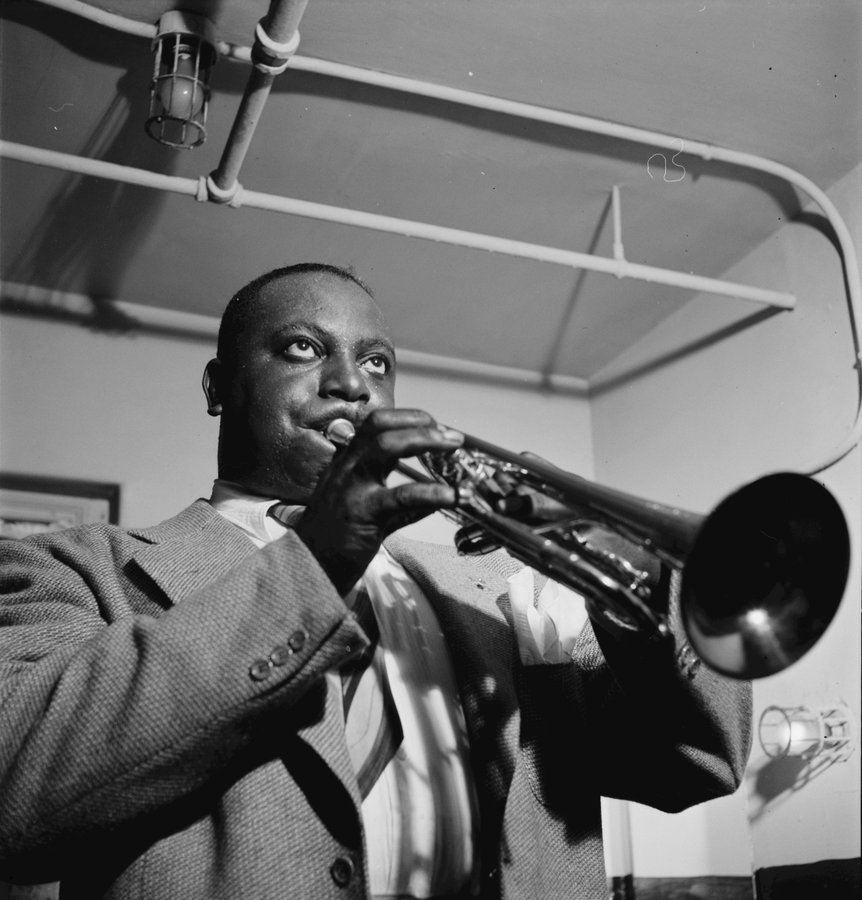COOTIE WILLIAMS
Charles Melvin "Cootie" Williams (Mobile, Alabama, 24 de julio de 19101 o 10 de julio de 19112 – Long Island, Nueva York, 15 de septiembre de 1985) fue un trompetista y compositor estadounidense de jazz y jump blues.
Comenzó estudiando trombón y tuba, a la vez que practicaba de forma autodidacta con la trompeta, tocando en varias bandas locales juveniles, en una de las cuales coincidión con Lester Young. En 1928, se traslada a Nueva York, donde se incorpora a la big band de Chick Webb y, ocasionalmente, a la de Fletcher Henderson. Un año más tarde entra en la orquesta de Duke Ellington, para sustituir a Bubber Miley, permaneciendo con Ellington hasta 1940, y convirtiéndose en una de sus estrellas. Toca después con Benny Goodman y, después, con el sexteto de Charlie Christian. Después, forma su propia big band, en la que incorpora a músicos talentosos como Bud Powell o Eddie Vinson. Con esta orquesta, o con pequeñas formaciones, se mantiene como banda residente del Savoy Ballroom, una de las salas más importantes de Nueva York, durante casi 16 años.
En los años 1960, vuelve a la orquesta de Duke Ellington, permaneciendo con su hijo Mercer Ellington en la banda reconstruida tras la muerte del duque (1974). Participó en un gran número de películas musicales junto con Ellington.
Estilo
Williams fue uno de los maestros de la sordina, con la que lograba mantener un sonido punzante y emotivo. En sus primeros tiempos en la banda de Ellington, sucedió a Miley en la responsabilidad de mantener el sonido jungle que la hizo popular. Su estilo estaba muy influido por Louis Armstrong, aunque también por King Oliver,4 y fue un excelente solista, con un fraseo muy bien articulado y sonido cristalino sin la sordina. Como compositor, destaca entre todas sus obras la que firmó a medias con Thelonious Monk, 'Round Midnight.
Charles Melvin "Cootie" Williams (July 10, 1911 – September 15, 1985) was an American jazz, jump blues,and rhythm and blues trumpeter.
Born in Mobile, Alabama, Williams began his professional career at the age of fourteen with the Young Family band, which included saxophonist Lester Young. According to Williams he acquired his nickname as a boy when his father took him to a band concert. When it was over his father asked him what he'd heard and he replied, "Cootie, cootie, cootie."
In 1928, he made his first recordings with pianist James P. Johnson in New York, where he also worked briefly in the bands of Chick Webb and Fletcher Henderson. He rose to prominence as a member of Duke Ellington's orchestra when the band was playing at the Cotton Club, with which he first performed from 1929 to 1940. He also recorded his own sessions during this time, both freelance and with other Ellington sidemen. Williams was renowned for his "jungle" style trumpet playing (in the manner of Ellington's earlier trumpeter Bubber Miley and trombonist Joe "Tricky Sam" Nanton) and for his use of the plunger mute. He also sang occasionally, a notable example being in the Ellington piece, "Echoes of the Jungle". For him, Duke Ellington wrote ''Concerto for Cootie,'' which when lyrics were added became "Do Nothing till You Hear from Me". He was also the soloist in other major Ellington compositions like ''Echoes of Harlem'', "Harlem Air Shaft", and the religious piece ''The Shepherd Who Watches Over the Night Flock,'' which was dedicated to the Rev. John Gensel.
In 1940 he joined Benny Goodman's orchestra, a highly publicized move that caused quite a stir at the time (commemorated by Raymond Scott with the song "When Cootie Left the Duke"), then in 1941 formed his own orchestra, in which over the years he employed Charlie Parker, Eddie "Lockjaw" Davis, Bud Powell, Eddie Vinson, and other young players.
In 1947, Williams wrote the song "Cowpox Boogie" while recuperating from a bout with smallpox. He contracted the disease from a vaccination he insisted all band members receive.
By the late 1940s Williams had fallen into obscurity, having had to reduce his band numbers and finally to disband.In the 1950s, he began to play more rhythm and blues, toured with small groups, and played in the Savoy Ballroom.
In the late 1950s he formed a small jazz group and recorded a number of albums with Rex Stewart, as well as his own album, Cootie in Hi-Fi (1958). In 1962, he rejoined Ellington and stayed with the orchestra until 1974, after Ellington's death. In 1975, he performed during the Super Bowl IX halftime show. He was a 1991 inductee of the Alabama Jazz Hall of Fame.
Death
Williams died in New York on September 15, 1985, at age 74 from a kidney ailment. He is interred in Woodlawn Cemetery in The Bronx, New York City.





Comentaris
Publica un comentari a l'entrada